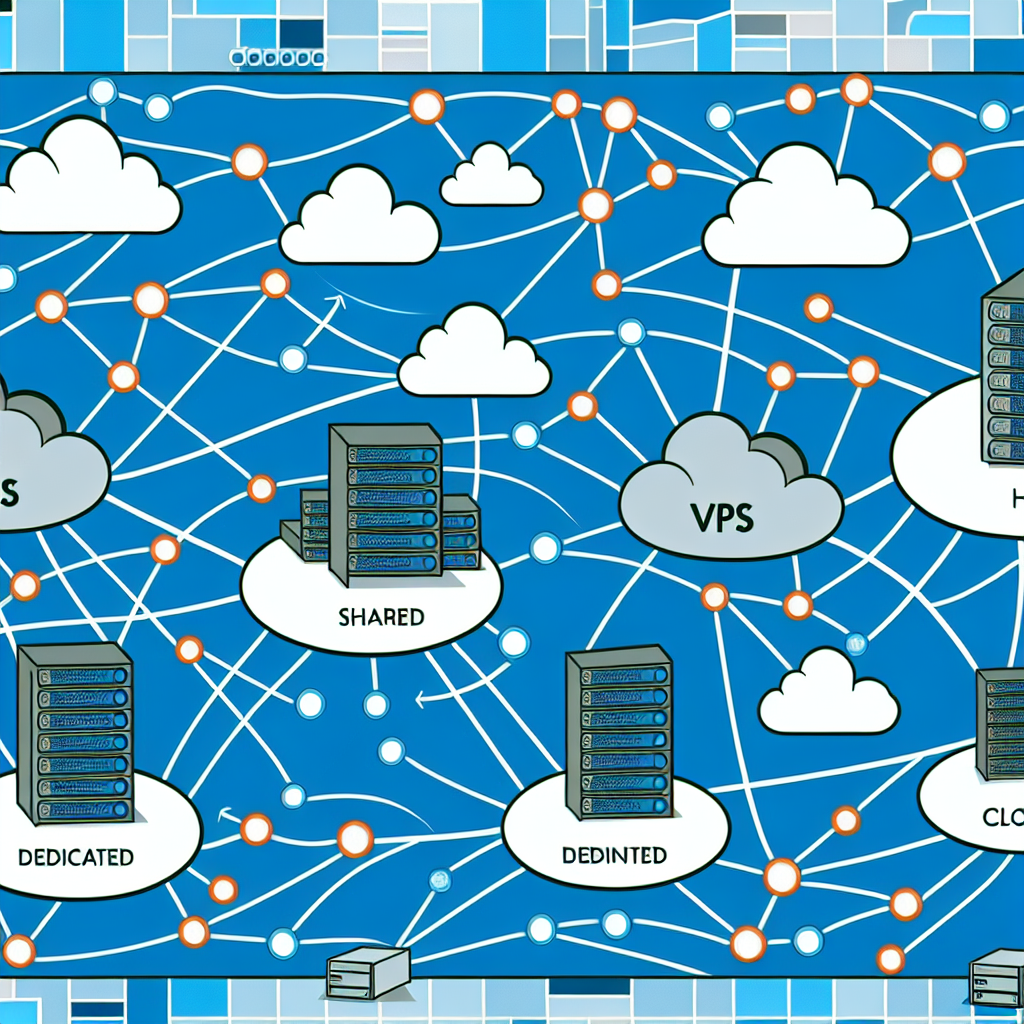In today’s digital era, where over 1.7 billion websites exist on the internet, making the right choice in web hosting has become more crucial than ever. The vast digital landscape is continuously expanding, and with it, the variety of hosting services available. This variety, while beneficial, can often be overwhelming, especially for newcomers. It begs the important question: Understanding the Different Types of Web Hosting: Which One Do You Need? Making an informed decision can significantly impact your website’s performance, security, and overall success online.
This article aims to demystify the complexities surrounding web hosting. By breaking down the technical jargon and presenting the information in an easy-to-understand format, readers will be equipped with the knowledge to make an educated choice. Whether you’re launching a personal blog, a bustling e-commerce site, or looking to expand your business’s online presence, Understanding the Different Types of Web Hosting: Which One Do You Need? is a question that we will explore in depth. From shared to dedicated hosting, cloud to VPS, each type has its unique advantages and considerations. Let’s dive into the details to find out which web hosting solution aligns best with your digital aspirations.
Understanding the Different Types of Web Hosting: Which One Do You Need? – An Overview

In the rapidly evolving landscape of the internet, selecting the right web hosting service is a pivotal decision for the success of your website. With a myriad of options available, understanding the different types of web hosting and discerning which one you need is essential. This overview aims to shed light on this critical choice, guiding you through the various hosting types to help identify the best fit for your online project.
The Spectrum of Web Hosting Services
At its core, web hosting is a service that allows individuals and organizations to make their website accessible via the World Wide Web. However, not all web hosting is created equal. The right type of hosting can vary significantly depending on your website’s size, traffic, and technical requirements.
Shared Hosting: The Entry-Level Choice
Shared hosting is where multiple websites share a single server’s resources. It’s the most cost-effective option, ideal for small to medium-sized websites with moderate traffic levels.
VPS Hosting: A Step Up
Virtual Private Server (VPS) hosting splits a server into virtual servers, where each website is hosted on its dedicated slice of the server. This option offers more control and resources than shared hosting, suitable for websites with growing traffic.
Dedicated Hosting: The Top Tier
Dedicated hosting provides a website with its server, offering maximum control, resources, and security. This type of hosting is best for large, high-traffic websites and those with specific custom requirements.
Cloud Hosting: Flexible and Scalable
Cloud hosting is a modern solution where your website is powered by a network of virtual and physical cloud servers, offering high scalability and reliability. It’s an excellent choice for websites with fluctuating traffic.
Understanding the Different Types of Web Hosting: Which One Do You Need?
Making the right hosting choice involves assessing your website’s needs in terms of traffic, resource requirements, budget, and technical expertise. For instance, a small personal blog or portfolio website might find shared hosting sufficient, whereas an e-commerce site with high traffic would benefit more from the scalability of cloud hosting or the resources of a dedicated server.
In navigating the web hosting landscape, consider the following factors:
- Traffic Volume: Higher traffic sites require more resources and bandwidth.
- Website Type: E-commerce, blogs, and personal websites have different hosting needs.
- Budget: Determine what you’re willing to spend on hosting services.
- Technical Skills: Some hosting types require more technical expertise than others.
Understanding the different types of web hosting and which one you need is a foundational step in ensuring your website’s success. As you embark on this decision-making process, weigh the pros and cons of each hosting type against your site’s specific needs and growth plans. This thoughtful approach will pave the way for a robust online presence that can adapt and thrive in the dynamic digital world.
The Essentials of Shared Hosting: A Starting Point for Beginners

Diving into the realm of web hosting can feel like navigating a vast ocean, especially for those just beginning their digital journey. The first port of call for many is shared hosting, a cost-effective and user-friendly option that lays the foundation for understanding the different types of web hosting: Which one do you need? Shared hosting is often heralded as the entry-level choice, offering a mix of affordability and simplicity that appeals to personal blog owners, small businesses, and those testing the waters of the online world.
What is Shared Hosting?
Shared hosting is akin to renting an apartment in a large building; you have your own space, but you share resources like water, electricity, and common areas with other tenants. In shared hosting, your website resides on a server with multiple other websites, sharing the server’s resources such as CPU, memory, and disk space. This setup is what makes shared hosting incredibly cost-effective, as the cost of server maintenance is divided among all users.
Key Advantages of Shared Hosting
- Cost-Effectiveness: The most appealing aspect of shared hosting is its affordability. It’s an ideal starting point for those who are cautious about investing heavily in their initial web presence.
- Ease of Use: Providers often include user-friendly control panels, making website management straightforward for beginners.
- Maintenance and Upgrades: The hosting provider takes responsibility for server maintenance, security updates, and technical issues, relieving you of these concerns.
Considerations and Limitations
While shared hosting is a great starting point, it’s important to be aware of its limitations. As your website grows in traffic and resource needs, shared hosting may struggle to keep up due to:
- Shared Resources: High traffic on one website can affect the performance of others on the same server.
- Limited Customization: There’s less freedom to customize server settings or install specific software, as changes can impact all sites on the server.
Is Shared Hosting Right for You?
Understanding the different types of web hosting: Which one do you need? involves assessing your current needs and future growth. Shared hosting is perfect for:
- New Websites: Small sites with low to moderate traffic, such as personal blogs or portfolios.
- Budget-Conscious Users: Those looking to minimize upfront costs while establishing an online presence.
- Non-technical Users: Individuals who prefer a hosting solution that doesn’t require advanced technical knowledge for daily operations.
In sum, shared hosting offers a practical and economical option for those starting out or operating small websites. It provides a gentle introduction to the world of web hosting, allowing you to focus on building and managing your site without worrying about the complexities of server management. As you delve deeper into understanding the different types of web hosting: Which one do you need? remember that shared hosting could be the stepping stone you need to embark on your online journey.
Exploring VPS Hosting: The Middle Ground for Growing Sites

As your website starts to grow, finding the right hosting solution becomes paramount to sustaining that growth while ensuring efficient performance. VPS (Virtual Private Server) hosting emerges as a compelling choice for websites that have outgrown the limitations of shared hosting but are not yet ready to leap into the complexities and costs of dedicated hosting. This middle ground offers a blend of affordability, flexibility, and scalability that growing sites need. By exploring VPS hosting, we delve into an essential part of understanding the different types of web hosting: Which one do you need? Let’s navigate through the specifics of VPS hosting to determine if it’s the right fit for your burgeoning site.
What is VPS Hosting?
VPS hosting is a type of web hosting that uses virtualization technology to divide a physical server into multiple virtual servers. Each virtual server operates independently, with its own dedicated resources like CPU, RAM, and disk space. This setup ensures that your website has access to the resources it needs without being affected by other websites on the same server, a common issue with shared hosting.
Key Advantages of VPS Hosting
- Enhanced Performance and Reliability: With dedicated resources, your website can handle more traffic and process data more efficiently, leading to improved site performance and reliability.
- Scalability: Easily scale your resources up or down based on your website’s growth and traffic patterns, ensuring you only pay for what you need.
- Greater Control: Gain root access to your server, allowing for advanced customization and the ability to install and run any software your website requires.
- Improved Security: Benefit from a more isolated environment, reducing the risk of your site being affected by vulnerabilities of other sites on the same server.
Is VPS Hosting Right for You?
Understanding the different types of web hosting: Which one do you need? involves assessing your site’s specific requirements and growth trajectory. VPS hosting is particularly well-suited for:
- Medium-sized businesses experiencing growth
- E-commerce sites requiring enhanced security and performance
- Websites with fluctuating traffic that need scalable resources
- Developers and webmasters needing more control over their hosting environment
Making the Transition to VPS Hosting
Transitioning to VPS hosting from a shared hosting plan is a significant step in scaling your website’s capabilities. Here are a few tips to ensure a smooth transition:
- Evaluate Your Needs: Assess your website’s resource requirements, considering factors like traffic, data storage, and application needs.
- Choose the Right Provider: Look for a hosting provider with a strong reputation for reliability, customer support, and flexibility in scaling resources.
- Plan for Migration: Coordinate with your new hosting provider to plan the migration process, minimizing downtime and ensuring data integrity.
Conclusion
VPS hosting represents a middle ground for growing sites, offering the resources and flexibility needed to support expansion while remaining cost-effective. By understanding the different types of web hosting: Which one do you need?, and evaluating the advantages and suitability of VPS hosting for your website, you can make an informed decision that supports your site’s growth and performance needs.
Diving into Dedicated Hosting: When Exclusive Resources are a Must
For websites that demand peak performance, security, and control, dedicated hosting emerges as the unparalleled choice. This segment of our exploration into “Understanding the Different Types of Web Hosting: Which One Do You Need?” delves into why and when dedicated resources become a necessity for some online endeavors. Unlike shared or VPS hosting, dedicated hosting allocates an entire server to a single client, offering unmatched customization and exclusivity in managing and maintaining a website’s infrastructure.
What is Dedicated Hosting?
Dedicated hosting is a type of web hosting where a client leases an entire server not shared with anyone else. This exclusive access provides the highest level of resource allocation, privacy, and control. But understanding the different types of web hosting, particularly dedicated hosting, requires an appreciation of its core characteristics:
- Exclusive Server Use: The server is entirely yours, offering total control over its configurations, software installations, and hardware upgrades.
- Performance and Reliability: With all server resources dedicated to one site, performance spikes are virtually non-existent, making it ideal for high-traffic sites or those with specialized hardware needs.
- Security: Dedicated servers offer enhanced security features since you’re not sharing space with potentially malicious sites. Custom firewalls and security protocols can be implemented for an added layer of protection.
- Customization: Full root access allows for complete customization of the server environment to fit your specific needs.
When Do You Need Dedicated Hosting?
Understanding the different types of web hosting involves recognizing when it’s time to upgrade to dedicated hosting. It is particularly suited for:
- High-Traffic Websites: If your site receives a large volume of traffic, dedicated hosting provides the bandwidth and resources necessary to handle the load smoothly.
- Large E-commerce Platforms: Websites handling sensitive customer data and transactions require the enhanced security and performance that dedicated servers provide.
- Resource-Intensive Applications: Sites running complex applications, extensive databases, or specialized software that require specific server configurations will benefit from dedicated hosting.
Choosing the Right Dedicated Hosting Provider
Selecting a dedicated hosting provider is a critical step in ensuring your website’s success. Here are a few considerations:
- Support: Look for providers offering 24/7 technical support with proven expertise in managing dedicated servers.
- Customization Options: Ensure the provider allows full root access and a wide range of hardware and software customization options.
- Security Features: Prioritize providers that offer advanced security measures, including DDoS protection, SSL certificates, and regular backups.
- Bandwidth and Data Transfer: Assess the provider’s bandwidth offerings and data transfer capabilities to ensure they meet your site’s needs.
In the journey of “Understanding the Different Types of Web Hosting: Which One Do You Need?”, dedicated hosting stands out for those seeking the pinnacle of performance, security, and control. It’s the go-to option for large-scale, high-traffic websites and those with specific, resource-intensive requirements. With the right provider, dedicated hosting can transform your online presence, offering a stable, secure, and high-performing foundation for your digital endeavors.
Cloud Hosting: The Flexible, Scalable Solution
In a world where digital real estate is expanding by the second, cloud hosting has emerged as a beacon of flexibility and scalability for websites of all sizes. This innovative hosting solution caters to a broad spectrum of needs, from startups dreaming of viral growth to established sites seeking unparalleled stability. Understanding the Different Types of Web Hosting: Which One Do You Need? becomes pivotal as you delve into the realm of cloud hosting, a model that breaks free from the physical constraints of traditional hosting to offer a truly adaptive environment for your online presence.
The Essence of Cloud Hosting
Cloud hosting operates on a network of interconnected virtual servers that draw resources from a centralized pool. This means your website can easily scale its resources up or down, depending on traffic spikes or dips, ensuring optimal performance and user experience at all times. The distributed nature of cloud hosting provides a robust safeguard against hardware failure, as your site can be seamlessly switched to another server in the network, minimizing downtime.
Why Consider Cloud Hosting?
- Scalability: Effortlessly adjust your resource allocation in real time to meet demand.
- Reliability: Benefit from a network of servers, reducing the risk of downtime.
- Cost-Effectiveness: Pay only for the resources you use, making it a financially savvy option for sites with fluctuating traffic.
- Performance: Enhanced loading times and site speed thanks to distributed resource allocation.
Is Cloud Hosting Right for You?
Understanding the Different Types of Web Hosting: Which One Do You Need? involves assessing your site’s specific requirements. Cloud hosting is particularly advantageous for:
- E-commerce Platforms: Handle sudden surges in traffic during sales or holiday seasons without a hitch.
- Apps and Services: Provide a consistent user experience by scaling resources in response to user engagement.
- Growing Blogs and Websites: Adapt to growing readership without the need for manual adjustments to your hosting plan.
Making the Shift to Cloud Hosting
Transitioning to cloud hosting can seem daunting, but the process is straightforward with the right provider. Look for features that align with your needs, such as auto-scaling, easy-to-use control panels, and robust security measures. Prioritize providers that offer excellent customer support, as navigating the intricacies of cloud hosting can require guidance.
In understanding the Different Types of Web Hosting: Which One Do You Need?, it’s clear that cloud hosting offers a compelling solution for those seeking flexibility, scalability, and reliability. Whether you’re just starting or looking to elevate an existing site, cloud hosting adapts to your journey, supporting your growth every step of the way.
Understanding the Different Types of Web Hosting: Which One Do You Need? – Making the Right Choice for E-commerce
Selecting the right web hosting for your e-commerce site is pivotal to ensuring smooth operations, optimal performance, and a secure environment for your customers. The question, “Understanding the Different Types of Web Hosting: Which One Do You Need?”, becomes even more critical when it comes to e-commerce websites. These platforms not only require the basic functionalities of hosting but also need enhanced security, scalability, and reliability to handle the dynamic nature of online shopping. In this section, we explore the various web hosting options available and how they align with the needs of e-commerce sites, guiding you towards making an informed decision for your online business.
Understanding Your E-commerce Website’s Hosting Needs
Before diving into the options, it’s essential to assess the specific needs of your e-commerce site. Consider factors such as expected traffic, the volume of products, security requirements, and the need for scalability. These factors will significantly influence which type of web hosting is best suited for your online store.
Shared Hosting: A Budget-Friendly Option
Shared hosting, where multiple websites share a single server’s resources, can be a cost-effective starting point for new, small e-commerce sites with low traffic. However, shared resources can lead to slower website performance during peak times, which can affect the user experience and sales.
- Pros: Cost-effective, easy to set up
- Cons: Limited resources, potential for slow site performance
VPS Hosting: Balancing Cost and Performance
Virtual Private Server (VPS) hosting offers a middle ground between shared and dedicated hosting. With VPS, your e-commerce site is still hosted on a server shared with other sites but is allocated a dedicated portion of the server’s resources. This setup provides better performance and security than shared hosting, making it suitable for growing e-commerce sites.
- Pros: Improved performance, scalable resources
- Cons: More expensive than shared hosting, technical knowledge may be required for management
Dedicated Hosting: For High-Performance E-commerce Sites
Dedicated hosting provides your e-commerce site with exclusive access to a server’s resources. This type of hosting is ideal for high-traffic, large e-commerce sites that require maximum performance, security, and control.
- Pros: Optimal performance, enhanced security, full control over the server
- Cons: Significantly more expensive, requires technical expertise to manage
Cloud Hosting: Scalability and Flexibility
Cloud hosting utilizes a network of servers, offering unparalleled scalability and reliability for e-commerce sites. This option allows you to easily scale resources up or down based on traffic spikes, ensuring your site remains operational and responsive at all times.
- Pros: Highly scalable, reliable performance, pay-for-what-you-use pricing model
- Cons: Can be complex to set up, costs can escalate with increased usage
In the quest of “Understanding the Different Types of Web Hosting: Which One Do You Need?” for your e-commerce site, evaluate each option against your site’s specific needs. Consider starting with a more cost-effective solution like shared or VPS hosting if you’re launching a new site. For established sites with higher traffic, dedicated or cloud hosting may offer the performance and scalability needed to support your online business growth. Remember, the right hosting can significantly impact your e-commerce site’s success, making it crucial to choose wisely based on your current needs and future growth potential.
Navigating the World of Managed Hosting: Ease of Use for Businesses
In the fast-paced world of online businesses, finding a hassle-free, efficient hosting solution is paramount for success. Managed hosting emerges as a beacon for businesses seeking a blend of high performance, security, and minimal operational concerns. It’s a solution that essentially takes the technical weight off your shoulders, allowing you to focus on scaling your business rather than getting bogged down by the nitty-gritty of server management. For businesses pondering over “Understanding the Different Types of Web Hosting: Which One Do You Need?”, managed hosting offers a compelling answer, especially for those prioritizing ease of use and reliability.
The Allure of Managed Hosting for Businesses
Managed hosting stands out by offering an extensive range of services including hardware and software setup, maintenance, updates, and technical support. This comprehensive approach to web hosting is tailored to businesses looking to streamline their online operations. Here’s a closer look at what makes managed hosting an attractive option:
- Hands-Off Server Management: The service provider handles all aspects of server maintenance, including backups, updates, and security patches, freeing up your time and resources.
- Enhanced Security: With a dedicated team to manage your hosting, you benefit from advanced security measures tailored to protect your data and website from cyber threats.
- Expert Support: Access to a team of experts ensures any technical issues are swiftly addressed, minimizing downtime and maintaining optimal website performance.
- Customization and Scalability: Managed hosting services often offer customizable solutions that can grow with your business, ensuring your hosting aligns with your evolving needs.
Is Managed Hosting Right for Your Business?
Deciding on “Understanding the Different Types of Web Hosting: Which One Do You Need?” necessitates a careful assessment of your business’s specific requirements and resources. Managed hosting is particularly suited for businesses that:
- Lack in-house IT expertise or prefer not to allocate resources to managing web infrastructure.
- Require high levels of uptime and reliability for their website.
- Anticipate scaling up their online presence and require a flexible hosting solution that can adapt to changing needs.
- Prioritize security and wish to ensure their website and customer data are protected by the latest protocols.
Making the Transition to Managed Hosting
For businesses ready to make the leap to managed hosting, here are some steps to ensure a smooth transition:
- Assess Your Needs: Clearly define your website requirements, expected traffic, storage needs, and any specific applications or software you’ll be running.
- Research Providers: Look for hosting providers that specialize in managed hosting for businesses, focusing on their reputation, customer reviews, and the range of services offered.
- Consider Scalability and Flexibility: Choose a provider that offers scalable solutions to accommodate your business growth without requiring a complete overhaul of your hosting environment.
- Evaluate Support and Security: Ensure that the provider offers robust 24/7 technical support and comprehensive security measures.
Managed hosting represents a strategic investment for businesses focused on growth, security, and operational efficiency. By delegating the technical complexities of web hosting to experts, businesses can concentrate on their core activities, secure in the knowledge that their online presence is in capable hands. If you’re in the process of “Understanding the Different Types of Web Hosting: Which One Do You Need?”, considering managed hosting as a viable option might just be the solution your business needs to thrive in the digital marketplace.
In conclusion, understanding the different types of web hosting: which one do you need? is fundamental in laying the foundation for your website’s success. From shared hosting, ideal for beginners, to the scalability of cloud hosting for growing businesses, and the dedicated resources of dedicated hosting for high-traffic sites, each type offers unique benefits tailored to specific needs. For e-commerce sites, making the right choice can significantly impact performance and customer satisfaction. Moreover, managed hosting presents a hassle-free option for businesses prioritizing ease of use and efficient management of their online presence. Ultimately, the key to making an informed decision lies in assessing your website’s requirements, anticipated growth, and the level of control you desire over your hosting environment. By carefully considering these factors, you can select the type of web hosting that not only aligns with your current needs but also supports your future ambitions, ensuring your online venture thrives in the competitive digital landscape.
